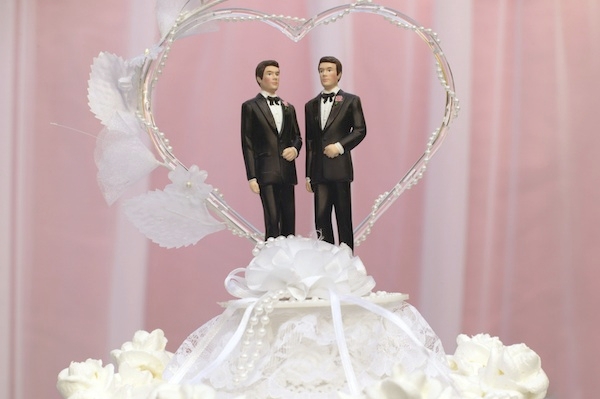‘The next time we want to import a horse to Russia,’ wrote Laura Brady, Second Secretary in our Moscow embassy, ‘it will be a doddle.’ I quote her story in an anthology of diplomatic writing, The Spanish Ambassador’s Suitcase, that the BBC’s Andrew Bryson and I have collected for the new book. Miss Brady was giving the Foreign Office an account of her efforts to collect a horse from Moscow’s station. The horse was a present to the Prime Minister, John Major, from the President of Turkmenistan, who had despatched the fierce Akhal-Teke warhorse by train accompanied by a wagon-load of melons to pay the Russian Railways. The point Brady is making is that after a hilarious few days learning her way through a maze of Russian red tape, veterinary bureaucracy and railway obstructivism (and shovelling manure), she now knows the ropes. She smiles that she’ll probably never need the knowledge again.
Well, next time we want to make marriage available to same-sex couples, it will be a doddle. It’s likely that in the year ahead this measure will reach the statute book. But between here and there stretches a painful political road. And it didn’t have to be like this.
In its essentials this legislation could have been so much more painlessly eased into law, with less offence given (and taken) on all sides. We who support the measure should have learned from history. History would teach two things in particular: that words are terribly important to people; and that issues of conscience and party politics don’t mix.
First to conscience. Infinitely the most important piece of homosexual reform legislation was the 1967 Act that decriminalised sex in private between consenting adult males. A Labour home secretary, the late Roy Jenkins, was responsible for the reform.
But Jenkins was canny. This was never government legislation and nor was it formally associated with Labour. Jenkins used the age-old ploy of giving governmental fair wind to a private member’s bill brought in by the late Leo Abse, and a group of supporters from all parties. There was never any question of a whip being applied, and though more support came from Labour, the bill attracted support and opposition in both parties; but passed easily on a free vote of the whole House. Nobody could complain it hadn’t been in their manifesto, or that the government had ‘more important things to do’ than this. Yet Jenkins did get the credit he deserved; and the reform burnished Labour’s reputation as a humane and forward-looking political movement.
We could have learned from this. David Cameron only offered his party a free vote after it became clear they’d take it anyway; it looked like a retreat. In last year’s conference speech when the Tory leader promised this measure, he should have said that he was personally convinced this was a change whose time had come; but it shouldn’t be a party matter, and the government’s role should be restricted to giving the House the chance to decide, by offering time to a private member’s bill — on whose passage he suggested all parties might allow a free vote.
Mr Cameron would still have been seen, as he deserves to be, as the man to thank; the arithmetic of subsequent divisions would scarcely have been affected; and nobody could have complained that the proposal had not been in the Tory manifesto; or wasn’t a priority, or the kind of thing Tories should do.
Now to the other and more serious mistake. As is proved by the obloquy heaped on ‘political correctness’ (the expression can hardly be uttered without a snarl) we’re allergic to being told what we must call things. Any measure that can be smeared as ‘Orwellian’ is off to a bad start. It isn’t in fact true that we’ve all always known what the word ‘marriage’ means; there have been tremendous shifts in its meaning over the centuries, and within modern multi-faith Britain, between the state and the established church, and even between our churches, there are fundamental disagreements about the institution’s demands and bonds. The meanings of words shift all the time, the shifts driven by the way people choose to talk: a sort of cultural democracy. But when politicians try to grab the lexicographic reins, we stop arguing among ourselves and turn on them. Both the pro- and the anti- ‘gay marriage’ brigades have wanted the state to lay down their own preferred definition of the word ‘marriage’, each (correctly) accusing the other of this ambition; and each (correctly) insisting that the other’s definition is unacceptable to many.
And the way through — the way to make it a doddle? Learn from South Africa, where years ago the state decided to withdraw from the dictionary business, leave the old names alone, and give a new title to the civil contract the state offers partners who want civic recognition for their union. South Africa named it civil union, and this is all the civil power offers: to same-sex or heterosexual couples. Of course most South Africans carry on calling it ‘marriage’ as they always have, and an increasing number are becoming easy with the idea that this can apply to same-sex couples too. Churches, meanwhile, remain free to apply their own definitions. Everybody is.
But nobody — not the state nor the church — is commandeering anybody else’s word. That’s surely right. If language is to change, and it will, it will change by a developing informal consensus. I recommended the South African compromise in the Times much earlier last year, to a deafening silence.
I’m unhesitatingly supporting gay marriage now because I know which side I’d rather be with. But I don’t want to force the word on anyone and because of my age and generation I will feel a bit awkward about its new use for the rest of my life. Not so, I predict, the younger generations and those to come.
But that’s up to them. Gay people, many of them, have been earning in their own lives the palpable change in cultural attitudes towards their partnerships. Neither they nor the Church of England should expect the dictionary to do it for them.






Comments